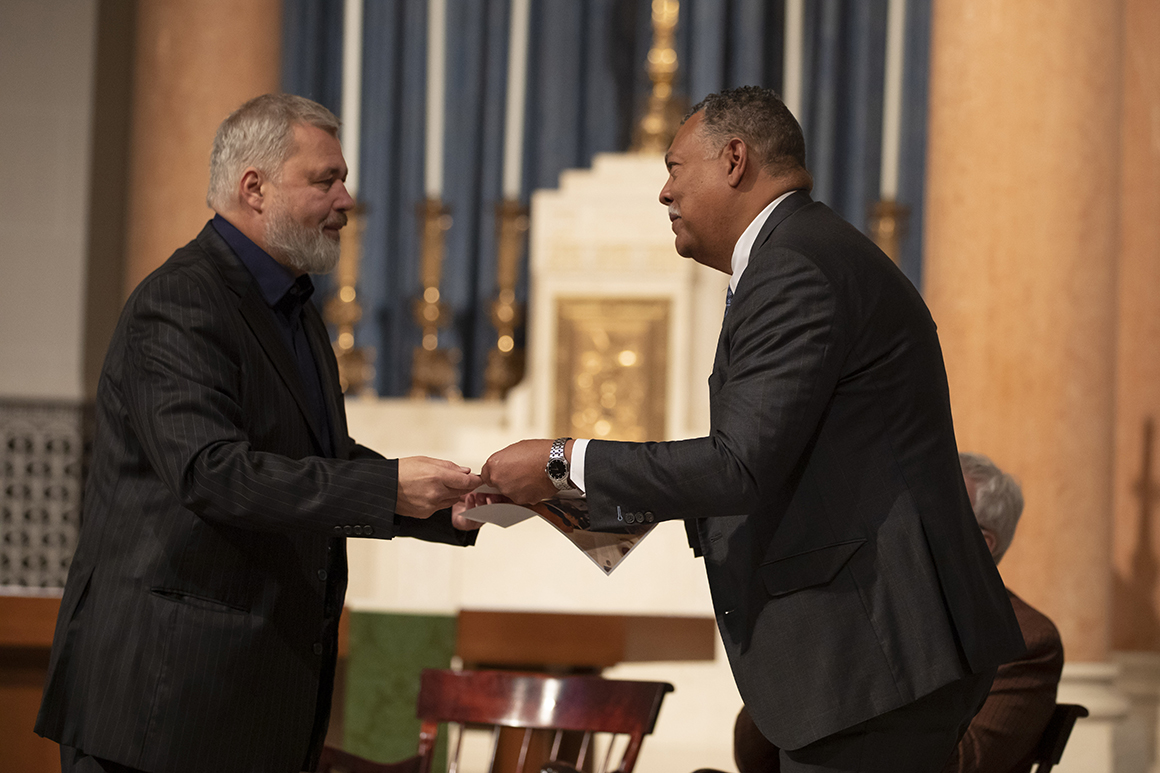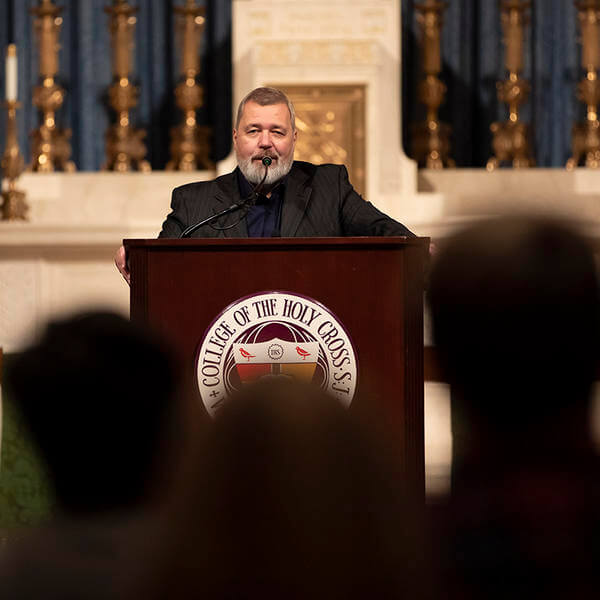Standing behind a podium in St. Joseph Memorial Chapel at the College of the Holy Cross, Dmitry Muratov relayed stories that invoked historic household names, like former president of Soviet Union Mikhail Gorbachev and political titans such as Ronald Reagan.
But for the hundreds in attendance at the Oct. 6 event, the Nobel Peace Prize-winning Russian journalist made sure they discovered another lesser-known historical figure: Stanislav Petrov.
Petrov, Muratov said, saved the world in 1983. A lieutenant colonel in the Soviet Air Defense Forces, Petrov was on watch when a Russian nuclear sensor showed that the United States had staged an attack on his country. Instead of returning fire, which would have sparked a nuclear war, Petrov waited and discovered that a glitch sparked the sensor and no attack was underway.
"We know more of Gorbachev and Reagan than Petrov," Muratov said through a translator. "It's now our task. Beyond acts of war, a movement should appear non-political — a social, religious-wide movement. Everything is in your hands."
As a journalist who has seen six colleagues murdered over the past 20 years, Muratov originally planned to speak to the College community about freedom of speech. He helped found the newspaper Novaya Gazeta in 1991 after the dissolution of the Soviet Union, and won the 2021 Nobel Peace Prize for his efforts to "safeguard freedom of expression." In June, Muratov auctioned off his Nobel medal for $103.5 million to aid Ukrainian refugees.
However, at the Holy Cross event, presented by The Rev. Michael C. McFarland, S.J. Center for Religion, Ethics and Culture, Muratov apologized and changed the topic of afternoon address, noting that Russia's invasion of Ukraine carried far more weight.
Through stories like that involving Petrov, Muratov emphasized the importance of every person in organizing an anti-war movement. He noted that the threat of nuclear war, which he said would kill seven times more people than the total loss of life in World War II, is still a very real possibility: "Missiles will lead to tsunamis of fire."
Since the Russian invasion of Ukraine, Muratov said that 269 independent media outlets have been blocked by the Russian government. An independent journalist was sentenced to 22 years in prison, he noted, just one of 17,000 people arrested for expressing anti-war sentiments in the country.
"I think that the Russian elite has betrayed their people," Muratov said. "They rejected their interests. The Russian elite created a new religion. Instead of an icon, they have a television set. Instead of apostles, you have propagandists. Instead of a God, you have [Russian President Vladimir] Putin." Russian journalist Dmitry Muratov, a 2021 Nobel Peace Prize winner, hands an image to College of the Holy Cross President Vincent Rougeau during a keynote address at St. Joseph Memorial Chapel.(Photo by Michael Ivins/Holy Cross)
Russian journalist Dmitry Muratov, a 2021 Nobel Peace Prize winner, hands an image to College of the Holy Cross President Vincent Rougeau during a keynote address at St. Joseph Memorial Chapel.(Photo by Michael Ivins/Holy Cross)
While world leaders like Putin have propagandist networks and thousands of nuclear weapons at their disposal, Muratov emphasized the non-violent weapons each person possesses: their words.
Muratov said the idea of peace originating from American and Russian civilians sparked the more than 30 years of peace following negotiations between Gorbachev and Reagan. That sentiment from every citizen in the world must reappear, he said.
A Holy Cross student agreed with Muratov during the question and answer portion of the event and asked where one starts and what advice the journalist could give.
The answer combined simplicity with the complex nature of international politics. Muratov's response showed that he, Gorbachev and Reagan are no different than anyone else: Each person has their own power to change the world.
"It's your time to decide," Muratov said. "All the leaders across the world should know that you are pressuring them to do something. How you do that, I don't know. But they should feel that pressure. They have taken your future. Their future is done. They don't have a future."
Russian Journalist Dmitry Muratov to Holy Cross Students: Anti-War Movement Is ‘In Your Hands’

The 2021 Nobel Peace Prize winner emphasized the influence every person has in maintaining peace in the world.
Read Time
3 Minutes

